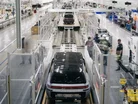Polestar and Rivian are driving forces in the EV transition

More than just advocates for the industry, but pioneers and activists for climate action, pure-play electric vehicle (EV) manufacturers are examples of how businesses can be formed around electric propulsion. To eliminate the 15% of global emissions produced by passenger vehicles, these companies join the fold as traditional car makers look to decarbonise their offerings and leverage the most innovative solutions of the past century.
EV companies Polestar and Rivian recently collaborated to share a report looking at the emissions of the projected passenger vehicle fleet globally to 2050, while exploring the industry's monumental challenges.
Why decarbonising the passenger vehicle industry is urgent
The International Energy Agency (IEA) estimates that there is a remaining global emission budget of about 500 GtCO2e (Gigatonnes of carbon dioxide equivalent) before 2050 to limit the temperature increase to 1.5°C.
If passenger vehicles continue to emit 15% of global GHG emissions, the industry has approximately 75–80 Gt of emissions left to stay within the budget. However, if we continue on the current trajectory, we will reach this budget by 2035, resulting in an overshoot of 75% by 2050.
Regardless of the approach experts choose to take, achieving the 1.5°C target will be challenging, and very few reports project scenarios that are achievable without accelerated action. The trajectory is uncomfortably close to the limits.
Consumer influence to increase the sustainability of the passenger vehicle industry
Transitioning to sustainability raises a number of challenges, including economic, social and raw material availability issues. Yet Polestar and Rivian both acknowledge that there are additional variables not covered, such as the impact of autonomous driving and sharing models, which need to be considered.
The report echoes that although the relationship between sustainability and profitability is often questioned, businesses must actually focus on the cost of inaction.
Similarly, consumer behaviour is changing. Sustainability is becoming an increasingly important factor in vehicle purchasing decisions, with 61% of respondents considering sustainability when buying passenger vehicles in 2021.
The study also found that the younger generation – Gen Z and Millennials – are more inclined to pay for greener products and will have increased purchasing power in the future. Consequently, the focus on sustainable solutions will only intensify.
Although limiting global warming to below 1.5°C will be a testing task for all industries, the passenger vehicle industry has an opportunity to redefine the challenge, reconsider competition and collaborate on collective actions to halve GHG emissions by 2030.
In the report, Polestar and Rivian echo that the need for action is evident, regardless of the debates about timelines, data and long-term targets.
Read the full report here.


